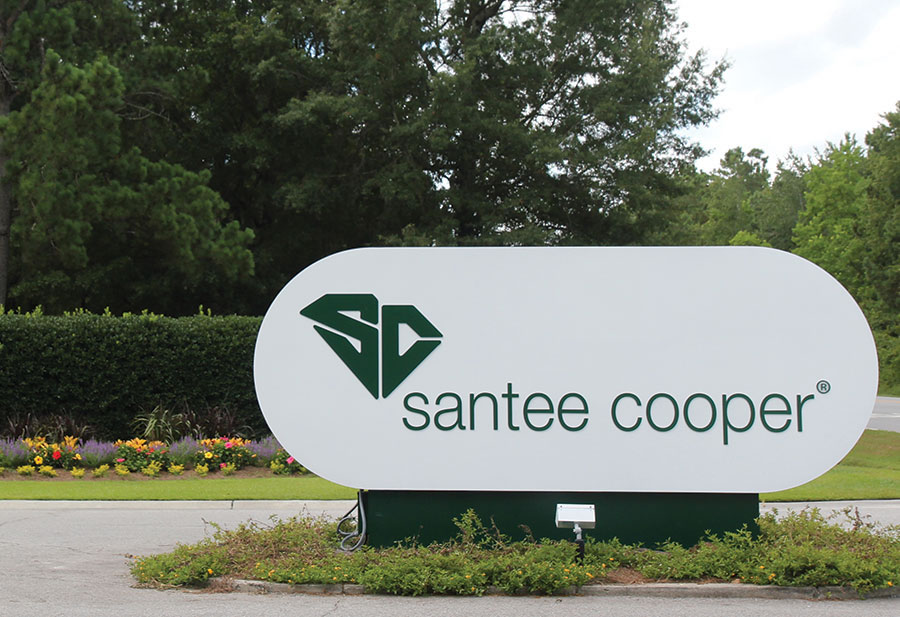
By Andy Brack, editor and publisher | Embarrassed by creating a controversial law that allowed utility companies to charge customers for projects that were not complete, the General Assembly wants to make it all go away.
 So they essentially got rid of the 2007 Base Load Review Act after two power companies, the private SCE&G and the public Santee Cooper, suffered the humiliating failure in 2017 of a $9 billion project to build a nuclear plant in Fairfield County. Since then, a Virginia company swept in to take over SCE&G and its parent, SCANA, and Santee Cooper became the legislature’s favorite whipping boy.
So they essentially got rid of the 2007 Base Load Review Act after two power companies, the private SCE&G and the public Santee Cooper, suffered the humiliating failure in 2017 of a $9 billion project to build a nuclear plant in Fairfield County. Since then, a Virginia company swept in to take over SCE&G and its parent, SCANA, and Santee Cooper became the legislature’s favorite whipping boy.
And now the General Assembly has thrown out a $14 million study on what to do next — sell Santee Cooper to a private company, let a private company manage it or reform the utility from within. Why? Apparently because leaders, blinded by the gods of privatization, didn’t like what the report said. So they’ve decided to change the rules and rush pell-mell down a shiny new, unexplored path to figure out what to do with Santee Cooper.
This is the height of arrogance. It illustrates how the conversation that’s been boiling isn’t really about electricity and South Carolina ratepayers. Instead, it’s about the legislature’s lust to beat its chest and show how it has power and knows better than anyone else.
Too many state lawmakers aren’t asking the right questions about future rates, control, debt and past performance of the players. Too many still enchanted by failed trickle-down economics seem deaf to anything other than privatization is best, regardless of consequences.
So here are just a few things to question:
Rates. While wonks at a pro-privatization think tank published a report denigrating Santee Cooper’s rates, they used the wrong figures (egg on face) — numbers from a cooperative, not Santee Cooper. A real comparison of rates for the average residential customer shows Santee Cooper’ rates are “clearly the lowest” compared to the for-profit utilities currently serving the state. Question: If an out-of-state company buys the non-profit Santee Cooper, do you really think it will lower rates to pay the $21 million salary of the private company’s top executive?
Control. South Carolinians, for better or worse, control Santee Cooper because it’s a public asset. But if it’s sold to a private company, South Carolinians will cede major control of what can be done. Question: What’s the advantage of losing control of a state asset that an overwhelming majority of ratepayers like?
Debt. Santee Cooper’s debt expanded by $4 billion after the nuclear deal failed. As of the end of 2020, its total debt was $6.8 billion, but a restructuring by new management has been paying off debt early. Santee Cooper’s opponents argue that S.C. ratepayers or citizens are liable for that debt. But the debt for the leading suitor to privatize Santee Cooper, NextEra Energy, was more than $47 billion in October. Questions: Do you really think NextEra’s debt will go down if it purchases Santee Cooper? Do you really think NextEra will shift the debt to shareholders and not ratepayers in South Carolina?
Past performance. NextEra recently tried to buy a Jacksonville, Fla., utility for $11 billion, a deal that has led to multiple investigations and media headlines like, “NextEra Energy’s failed attempt to purchase JEA highlights web of murky spending, lobbying.” Questions: With slick pieces of direct mail denigrating Santee Cooper now showing up in S.C. mailboxes paid for by unknown sources, is there any possibility that consultants, lobbyists, lawyers and well-paid marketing gurus are relentlessly attacking Santee Cooper in an orchestrated effort to influence lawmakers in South Carolina’s opaque political environment? Isn’t what’s happening an all-out underground campaign to poison the reputation of Santee Cooper so a company can buy the utility on the cheap?
One Santee Cooper retiree we know is disgusted about how the valued — and valuable — state utility is being raked over the coals after implementing internal reforms that are working.
“South Carolinians created this situation and South Carolinians can and are fixing this situation,” he said, adding that if you think it makes sense to transfer Santee Cooper to an outside behemoth, “you are sadly mistaken.”
Andy Brack is editor and publisher of Statehouse Report. His column also is published in the Charleston City Paper, Florence Morning News, Greenwood Index Journal, The (Seneca) Journal, Camden Chronicle Independent and Hartsville Messenger. Have a comment? Send to: feedback@statehousereport.com.
















 We Can Do Better, South Carolina!
We Can Do Better, South Carolina!
I think it is time for the elected officials of South Carolina to stop dragging their feet and actually, (finally), make a decision. They should, by now, be aware of all necessary information.
The consequences of privatization is how a foreign country like China could buy up failing energy cooperatives and “Control” the energy of American citizens. Is there anything wrong with maintaining control of a state electric cooperative? When you think about who is being served by Santee Cooper, most of James Clyburn’s Congressional district is serviced by Santee Cooper, along with big industry that provides jobs for those people whose lives have been struggling. Sell Santee Cooper and energy for the poor will rise. Santee Cooper has been serving South Carolina’s rural areas well for decades. Privatization would cause an out of state or foreign country to take control of our energy which would put the citizens at the mercy of outsiders.